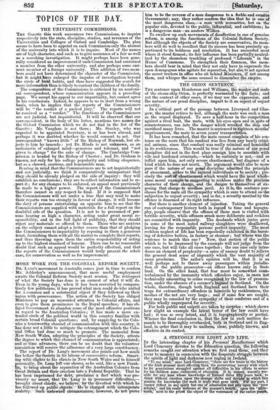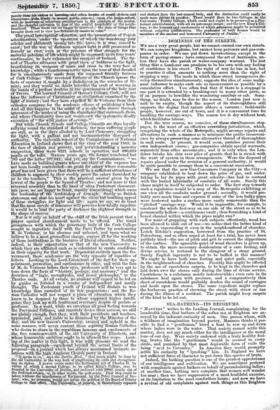A STRUGGLE FOR LIGHT AND LIFE.
IN the interesting chapter of his Personal Recollections which Lord Cloncurry devotes to the Education question, the following remarks caught our attention when we first read them, andAy recur to memory in connexion with the desperate struggle between the spirits of light and darkness now raging in Ireland. "To my mind," says Lord Clonc.urry, "there are few traits in theMB.: tory of the Irish peasant more affecting than the persevering energy with which he for generations struggled against all difficult* in Isis efforts to sere for his children some rudiments of education. It lie, scarcely pos- sible for any man whose knowledge of Ireland datsi fifty years back, to think without emotion upon the strange shifts aid 'devices ti which this passion for knowledge (for such it truly was) gave birth. For my part, I
cannot reflect in any spirit but one of admiration and pity upon the r scholar,' and his ready welcome at the peasant's hearth.; upon the ' o-
math,' next to the pneet the object of the veneration of the entire parish, parelyfienr hinichdms Ot leaning, anftea despite. of motel!defects and aberratiensolittle, likei itaf.ffecPre 1:44911844lek1il.lulll the holge-..seborol, • 54.-Y tart ,Iliarit tambil•e comforts of t (.. Jouster, with,ite and ttm * etizfrii o e co
" hospitality of the neivt-
bourli $ ' ;1 ,the state of things thit
brought them out to view has telytictisadito enitaat t,t
• Tr" at fitthilidiitsfriptIon of Popish schniAnilifa,2. .'' '.1 .bvegt tilIPOfitideringlpo6r sclin ..rand'011eniith' ' ; Oft iiii iiiiiCA4fised 4.43
' ' " the war of darkinkki ' • 3 t it/ Wpre§eetited is :40
fi ."-..eter, 'even in they . - ,.h Witiiiiiii atintgle'.fin4the
mil itar - of life whi '. .:ii fipPoPieViliaiti fotaryoktv
00'11*Rn:ulna 7,' 1i .+et- 'ids:A. 'ff4ifilreland'I,1 lhe'Sy- nod! Wthuiles •• of a Witness" to.the -fight, biahlraJihik: In =the very face of foe is ' • ul IMOirled .,. • .,. ,. "*.t th
....IL : .. . rer of that dreaded ' "'friendly fortress of CoiletO allitiroh ignore the facts of anatomy ik the miracles of Ri-
mini and. he tv" craft of weaving in
%SIB ' fthe hell- mat
"tlf tiluten IOork, will not eii)!Clioli diamined by the Mel' denr&lbdtii'from 'their
orthodox corn. or t e academic off of ulilishing a book.
Anti all' the inidit8 lib*Wife through ignoranWer tf using ilie ifgIiAnrbuntis there, and where fiees.nof liofr %a wit- , no, atie deadly
ekeention ' tilig4 instice'iff . Fit '*hI Church Synods eCbl1 !,diiiinfeili are thus loyally
'round the standard St 7ditillede her r Suffering people are , , as in the days allad • c !Acorn-, strugigling
' ,. • for light, with a gallant and "Aie 'disregard of
authority. The sixteentirreporti issioners of National
Education in Ireland shoiri that at't 6"Z oflhe year 1849, in
the face of chat:A.:find- rtV,.'ti a . thstanding a monster emigration 'thilriiiiipr' 321 sChbo If' ii:tOintilion- and 480,623 pupils on ttlefa.g.""siifdin4dais- "ste"tWeitater,immbered but
789 and the latter "tinil yet;eii 'Co ' sSionera, " we
have made no buildillgrate*here bid 8elf•,_ille expense has
not been locally contributed,* graik ' idit'ere reasonable
proof has not been glien that there will h0font attendance of children to augment by .their weekly pence the salary furnished by ...lit,* the teachers." This is the practical answer given by the lowlest of the people to the Synod Of Thurles ; and not More to that reverend assembly than to the band of ultwPretestant obscurant- ist§ (now, we are happy to think, rapidly' dieniiiiihing) which owns " The leadership of the Archbish.tog' Xrinagli. " "%My no British , , . r. ... . ,Aatesman can t his heart a, , the silenthittlonching appeal these struggls br light and.,)gfe : again itie ii4y, we do trust t the most servile df,i4nmers -*ill perceiVelW fatally impolitic
Iwould' belelend ili4 of 'darknesStheilliglatest strength in , . , . . the shape of success:
._Nor is it only on behalf of the child of the Irish peasant that a prayer against abandonment needs to be Offered. The timid promptness with which the governing, body WI Oa Cork College ?ought to ingratiate itself with the Parti Pretre by condemning M. -de Tericour, in his absence and unheard, and upon What We believe to be a niest., ondles§ charge, augurs ill for the working of those institn AU the business of liberal education. Neither, indeed, is their t4ution or that of the new 'University to which they are a Voted such as is calculated to create eenfidence in their eapaeity for that work. • 'pendent entirely upon the Go- vernment, those ,academies are the' very opposite of rqublies of letters. :looliii0o the Loret_lik nant of the day fa their ap- Ili pointment, prOineAfien, and eq*inei4 - q **lice, and with the fate of M. de Veriiionr before their'. s; infeisors will be very apt to tone down the facts of " histOY„ligeet6&, and anatomy," anci the doctrines of "logic, inetaphyldeVinit,Moral philosoily," to the
Thurles Scale. At all event.iy b Ent will expect to be led on
by guides so fette.red in a.;,' ‘ ill -indePendent and manly . thought. The ProtWant yobill. `blidid will disdain to woo
knowledge thus curtailed_ Of it ' tions ; and the Ro-
man Catholics will ifoi‘tetipeCtiil , .iMation which they know to be despised b tli ' ' 'hob uiposcd higher intelli- gence they looktiri* . ' Iiiiigil eibnce. despite of prelate or professor. Ind ii9.0 11.116* 'kit ' ii all ,"cod fieling towards
the Previticial tiff' ' ' iife &Sire their sikeess, we still
sa4 tip enoti4 ,,. ,, . ,. -tk .' ''` ' delitS and teachers, " id Mullikble te 'lli ti 'Minister of the i IPP" '' Pa 411 Yii friii4akil IR' ay, and the ne ti e s 9 1a ''.iiplaeld in the same manner, will never centent_those _mi Illoinan Catholics who desire 'M haFeu the repeb ' hmin emoluments of
the free commonwealth of the o ve 1 :Elizabeth, and
ettligl `kap e. Look-
tensire Ire read the
following partigraplis • lkotnid limits of the
proposal—in a journal W h litained intimate re- lations with the high Angi in Ireland. "It seems to us," says thalis.0 Much might be clone by the old University, in the way ".ite cords and strengthen- ing its stakes. Akiipter exists unftr, t Act of Charles DI. by
1:ti virtue of w ' a second College ,lo -ing's College, may be founded in the -versity of Dublin, and on Fith 20001. yearly out of the forfeited ' s, or, in other words, the .q .t4. That That step could be
taken without the interference of Parliament, .li ?ivy Council of Ire-
land; who' we presume ,would not refuse the f cbo Board of Trinity College to that e..4e:te:qrq-BNIVITPitYt,66014(tel . ilitKit19.40- *Fate hive or fth wliOseliOnonr0 aiifion ought lug at the maërintbs light. and distinct from the last-named body, and the distinction could easily be made more perfect in practice. There would Olen be two Colleges in the University : Trinity College' which could and ought to be preserved as a Pro- testant establishment, wih all its patronage intaet ; and the new King's Col- lege, to the honour,s and emoluments of which.admiaion might be permitted without religns qtafitication. The graduaW 'of both' houses would be -members of the ancient and honoured University of ;Dublin."



























 Previous page
Previous page